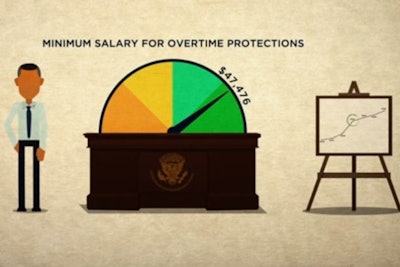
A new Department of Labor (DOL) overtime rule set to begin on Dec. 1, 2016, will impact millions of employees. The rule nearly doubles the amount of money a worker must be paid in order to be exempt from earning overtime pay.
Under the rule, most salaried workers earning up to $47,476 a year must be paid time-and-a-half overtime pay if they work more than 40 hours during a week. Previously employers were exempt from paying overtime pay to workers earning $23,660. The new rule is expected to make 4.2 million additional workers eligible for overtime pay.
The DOL released a list of frequently asked questions about the new overtime rule asked during a series of webinars held on the issue. The webinars were recorded and are available for viewing at any time.
Here are some of the questions and answers that might be applicable to your construction business:
Q. We are a seasonal property open 8 months - is the $47,476 based on that or 12 months?
A. The new salary is $913 per week. During the eight-month period that employees work at your property, you will need to guarantee that at least $913 per week is paid for an exempt employee. Please see FOH 22g10 concerning rules for annual salary earned in a shorter period, which https://www.dol.gov/whd/FOH/FOH_Ch22.pdf.
Q. Can an employer say that an Xmas bonus is part of your salary in effort to meet the new standard?
A. When the Final Rule takes effect on December 1, 2016, employers will newly be allowed to satisfy up to 10 percent of the standard salary level with nondiscretionary bonuses and incentive payments (including commissions). Nondiscretionary bonuses and incentive payments are forms of compensation promised to employees, for example, to induce them to work more efficiently or to remain with the company. By contrast, discretionary bonuses are those for which the decision to award the bonus and the payment amount is at the employer's sole discretion and not in accordance with any preannounced standards. An unannounced holiday bonus would qualify as a discretionary bonus, because the bonus is entirely at the discretion of the employer, and therefore could not satisfy any portion of the $913 standard salary level.
Q. What is the salary requirement for part time salary workers?
A. Whether a worker is full-time or part-time, the standard salary level to qualify for exemption will be $913 per week.
Q. How will this new rule affect California? California has always been consistent or more favorable to the employee than FLSA. This new rules suggests FLSA is now more favorable to the employee.
A. The Fair Labor Standards (FLSA) provides minimum wage and hour standards, and does not prevent a State from establishing more protective standards. If a State establishes a more protective standard than the provisions of the FLSA, the higher standard applies in that State. To the extent the new minimum salary amount of $913 per week under the Overtime final rule is higher than the State requirement, the employer in that State must comply with the higher standard and pay not less than $913 per week for an exempt white collar employee.
Q. Are employers in compliance if they follow the annualized amounts? (Or do they have to make sure they are always in compliance each week?)
A. An employee's exempt status - and, if nonexempt, the employee's right to overtime pay - is determined on a weekly basis. Generally, to retain exempt status, an employee must satisfy the duties test and earn at least $913 per week.
Q. Quarterly bonus: if an employee is paid between $822 and $913 per week, can the bonus be paid less frequently than quarterly?
A. No. To count toward the standard salary level, nondiscretionary bonuses must be paid quarterly or more frequently.
Q. Can we classify someone as Salary Non-Exempt and pay them less than the required amount but pay them overtime?
A. Yes, an employer is permitted to pay a non-exempt employee on salary basis which is less than the required $913 per week (New Overtime Final Rule) as long as the employee is not paid less than the federal minimum wage rate of for all hours worked and is paid overtime for all hour worked in excess 40 per week. For additional information, please review Fact Sheet 23: Overtime Pay Requirements of the FLSA.
Q. What is the definition of a highly compensated employee?
A. The Overtime final rule (effective Dec. 1, 2016) sets the highly compensated employee total annual compensation level to the 90th percentile of earnings of full-time salaried workers nationally ($134,000) annually). To be exempt as a highly compensated employee, an employee must also receive at least the new standard salary amount of $913 per week on a salary or fee basis and pass a minimal duties test (i.e., the employee customarily and regularly performs any one of more of the exempt duties or responsibilities of an executive, administrative or professional employee under the regulations).
Q. I know it is not changing but can you provide a simple definition as to what the duties test is? Is the duties test what defines whether an employee is exempt under executive/admin/professional?
A. WHD Fact Sheet #17A provides a concise overview of the applicable duties tests for all of the Section 13(a)(1) exemptions. That fact sheet is available at: https://www.dol.gov/whd/overtime/fs17a_overview.pdf.
Q. If our management team meets the test for the executive duties, does this exempt them from the overtime pay if they make under the newly required $913/per week rate?
A. An exempt executive, administrative, and professional employee must meet the duties test in addition to being paid on a salary basis and at the required salary level. Therefore, if an employee only meets the duties test and not the required salary level, they would not meet the criteria necessary to be considered exempt, and would be entitled to overtime in any week they work more than 40 hours.
Q. I have an employee that works 50 hours a week on exempt status. He will be moved back to hourly, and will get a pay reduction. This will help us to maintain his current weekly wage. Is this something that we can do and be in compliance with FLSA.
A. Employers have a range of options for responding to the updated standard salary level. For each affected employee newly entitled to overtime pay, employers may:
- increase the salary of an employee who meets the duties test to at least the new salary level to retain his or her exempt status;
- pay an overtime premium of one and a half times the employee's regular rate of pay for any overtime hours worked;
- reduce or eliminate overtime hours;
- reduce the amount of pay allocated to base salary (provided that the employee still earns at least the applicable hourly minimum wage) and add pay to account for overtime for hours worked over 40 in the workweek, to hold total weekly pay constant; or
- use some combination of these responses.
The circumstances of each affected employee will likely impact how employers respond to this Final Rule.
Q. Where can I find more information regarding making catch-up payments for non-discretionary bonuses?
A. 29 CFR Part 541.602(a)(3) as well as 81 Federal Register 32427 provides more information regarding the catch-up payments for non-discretionary bonuses.
Q. Bonus - we get up to 25% of our salary (with a fixed formula); does the new law apply?
A. Beginning on Dec. 1, 2016, employers may use non-discretionary bonuses and incentive payments (including commissions) to satisfy up to 10 percent of the standard salary level test ($913 per week, beginning on Dec. 1), provided that such payments are made on a quarterly or more frequent basis. Payments promised to the employee ahead of time and calculated according to a fixed formula would likely qualify as non-discretionary. Employers may continue to pay non-discretionary bonuses and incentive payments beyond those necessary to satisfy the salary requirement, but such payments may only satisfy up to 10 percent of the new standard salary level.
People also can submit their questions about the overtime rule to the Wage & Hour Division on the DOL.
For more information on the overtime rule, visit the Government Affairs section of the American Rental Association's website at ARArental.org. For additional information, contact Alysia Ryan, ARA director for state government affairs, by email or call 800-334-2177, ext. 271.







![[VIDEO] Fair Labor Standards Act Reduced Exemptions Raising Questions](https://img.forconstructionpros.com/files/base/acbm/fcp/image/2016/09/default.57ebc6d6e1e48.png?auto=format%2Ccompress&fit=crop&h=167&q=70&w=250)










